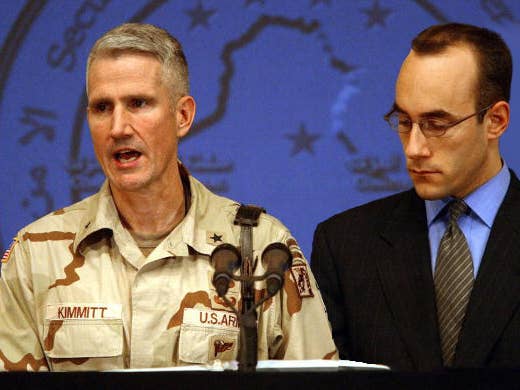
As Mitt Romney and Barack Obama clash on foreign policy today, Democrats are focusing their attacks not on the message but on the messenger: Romney foreign policy advisor Dan Senor, who remains best-known for his stint as the face of the early American occupation of Iraq.
Senor, a former Republican congressional staffer who is now an executive at a hedge fund, has become perhaps Romney’s most visible foreign policy spokesman. His emergence tracks the former Massachusetts governor’s shift since 2008 toward a hawkish internationalism that some Bush Administration critics, and insiders, described as neo-conservatism. And while Republicans see an effort to restore a more unambiguously forceful American presence in the world, Democrats see in Senor’s emergence an extension of the unpopular Bush Administration and its unpopular war.
That effort kicked into high gear today when Senor headlined a Romney campaign conference call attacking Obama's foreign policy. The Obama campaign responded by sending reporters an 1,161 opposition research document headed: “DAN SENOR WAS THE BUSH ADMINISTRATION’S SPIN MASTER FOR THE WAR IN IRAQ AND WORKED TO ADVOCATE LONGER U.S. INVOLVEMENT IN IRAQ” and quoting some of Senor’s most optimistic comments from the early days of the war. (He said in October 2003 that “the overwhelming majority of Iraqi people have embraced the liberation and are grateful” to the U.S.,” and in 2004 that he country was “returning to normalcy.”
“Whether it’s the economic team that turned a record surplus into a record deficit, or the foreign policy team that led us into the Iraq war and strained our alliances around the world, there’s no doubt that Mitt Romney is getting the band back together,” Obama campaign press secretary Ben LaBolt told BuzzFeed.
Administration allies were more explicit in their shots at Senor.
“There is no greater aberration in American policy than that 2003-4 period, and Dan was the spokesman for that,” said Michael Breen, vice president of the Truman National Security Project, who was an army captain in Iraq while Senor was the spokesman for the CPA in 2003 and 2004. “The CPA was the most dysfunctional organization of any in the last 100 years of American history and now he’s a foreign policy adviser for Mitt Romney.”
“That is literally the time and the place that that country descended into chaos, and he was the guy telling the American people that it was going well,” Breen said.
“It speaks volumes about the challenge the GOP faces on national security that they put forward Senor — the face of the some of the worst of Iraq — as a spokesman,” said Heather Hurlburt, the executive director of the progressive National Security Network said, noting that defending the Iraq war has not been a recent feature of Republican politics.
“Their surrogate Marco Rubio gave a policy speech yesterday that didn't mention Iraq once,” she said.
Senor was among the first American civilians to enter Iraq with the invading American forces, and served as an advisor to the first leader of the American effort in Iraq, Presidential Envoy L. Paul Bremer. Many Republicans now view the Iraq war as, in retrospect, a success, and say early mistakes can hardly be blamed on Senor. Senor has since emerged as a leading figure in Republican policy on the Middle East, for instance accompanying Gov. Chris Christie on a high-profile trip to Israel earlier this year.
On today’s call, Senor described defenses of Obama’s foreign policy record as a “fantasy narrative,” and argued that the administration had broken with generations of American foreign policy tradition by “leading from behind.”
He also made the case for stronger American support for the opposition in Syria, and suggested that elements of Obama’s Middle East policy whose forcefulness has won Republican approval has been in part the result of conservative pressure.
Senor didn’t respond to an inquiry about the criticism, but a Romney campaign spokeswoman, Andrea Saul, defended him.
“Dan is a respected figure in the foreign policy community and a valued adviser to the campaign,” she said.
Saul also, however, was quick to distance Romney association with any of his many foreign policy advisors’ views or records.
Romney has “assembled a diverse group of foreign policy thinkers,” she said. “He fields their advice, evaluates it, and ultimately makes his own decisions.”
The spat over Senor came as Vice President Joe Biden delivered a broadside at Romney, suggesting he might not have made the decision to strike Osama Bin Laden in Pakistan, and associating Republican foreign policy positions with the Cold War past. After his speech, an array of surrogates sought to drive the point home by pointing to Senor and other former Bush Administration officials advising him.
Colin Kahl, who served three years in the Pentagon as top advisor on Iraq policy, called Romney an "empty vessel," who will be overly-influenced by his advisers.
"Who is he being filled up with? The last empty vessel [President Bush] dragged us into the war in Iraq. Is Romney's empty vessel filled up with the same stuff," he asked.
